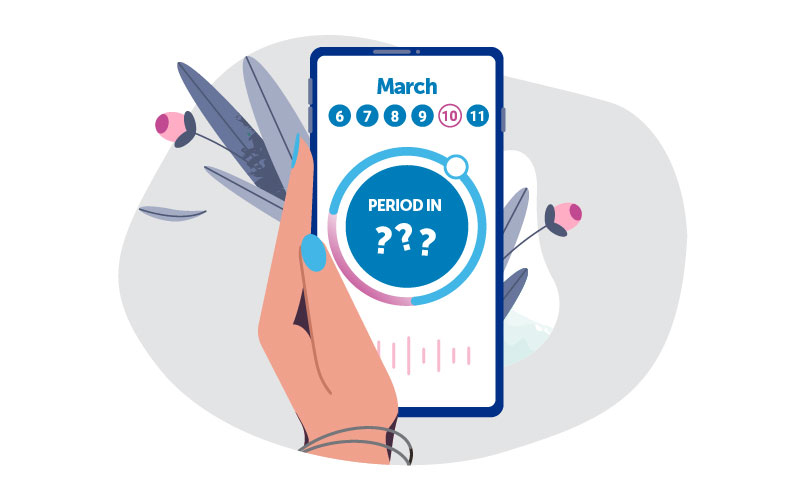Out of balance: How hormones can affect your child’s period

If your tween or teen is experiencing irregular periods, they aren’t alone. In the first two years after getting a period, you should expect fluctuation in cycle length and the number of days their period lasts.
However, there are period symptoms that go beyond what makes a “normal” irregular period. If your child’s period hasn’t started within three years of developing breasts (or by age 15), if their period consistently lasts longer than eight days, if they frequently skip two to three months between periods, or if they experience frequent blood clots instead of a steady flow, that may signal a deeper problem that requires specialized care.
We spoke with Dr. Sarah Pitts, co-director of the Reproductive Endocrinology and PCOS Program and the Long-Acting Reversible Contraception Program and attending physician at Boston Children’s, about hormonal problems that can delay or disturb your child’s period — and what it could mean for future fertility.
PCOS: A common culprit
There are many causes that can trigger a hormone imbalance that can throw off or delay menstruation. Common problems include psychological stress, nutrition insufficiency, and eating disorders.
However, up to 10 percent of adults with a uterus have polycystic ovary syndrome (PCOS), a hormonal imbalance that throws off messages between the brain and ovaries. It’s important to remember that PCOS is a syndrome, not a disease. It’s a group of symptoms without a clearly identified underlying cause for some individuals.
Common symptoms of PCOS include:
- Missed or irregular periods, or a period that doesn’t begin before age 15
- Extra acne or hair growth in places that are not typical, including the chin, jawline, or chest
- Lab tests that are consistent with PCOS, like elevated levels of androgens — the hormones that stimulate acne and hair growth
“In the first two years of a person’s period, we try not to apply the label of PCOS because periods are often initially irregular and may regulate in time,” Pitts explains. “Teens often have acne and certain hair growth patterns may be normal for a given family. These findings alone don’t necessarily point to PCOS initially. But if periods don’t regulate after two years, and acne and hair concerns persist, PCOS is likely the cause.”
Not everybody with a PCOS diagnosis has the same symptoms or underlying cause. For some, insulin resistance causes PCOS while this may not be the case. If you’re able to track a history of PCOS within your family, that can help with ruling out other symptoms.
Common treatment for irregularity
Treatment for PCOS also can vary from person to person. If insulin resistance is throwing off the communication between the brain and ovaries, you might be looking at medication or lifestyle changes, like diet or exercise, to resolve persistent symptoms and ultimately return menstruation to normal.
If insulin resistance isn’t a factor, Pitts advises parents and teens to seek treatment for the symptoms that are most bothersome to them. Treatment can include medication for acne and hair growth or medicine to help regulate periods. Hormonal agents, such as combined hormonal contraceptives, address irregular periods while also lowering androgen levels to reduce acne and hair growth.
Pitts adds that future fertility is often hard to predict for people with PCOS. While individuals with PCOS can still become pregnant — sometimes unexpectedly — it is still incredibly important that they use contraception when necessary. “Adolescence is a time of hormonal chaos, so I always remind patients that the clinical picture you’re looking at now isn’t necessarily what it will be when you’re 25 or 30 years old,” says Pitts.
Premature ovarian insufficiency
A less common reason your child may not have begun menstruation is due to a condition called premature ovarian insufficiency (POI). This condition occurs when the ovaries have stopped working properly before the age of 40.
Like PCOS, there are many reasons a person may develop POI:
- genetics, like Turner syndrome
- autoimmune conditions
- chemotherapy and radiation therapy
- rare diseases, like galactosemia
“It can happen at any time before age 40. That means some people with POI have had full breast development and periods, while others never had a period or breast development,” Pitts explains. “For those people, hormone replacement therapy can advance their body through normal puberty.”
Treatment is unique to each individual, however, for most patients, bone health and fertility are primary concerns.
“When your ovaries aren’t working as we would expect, the body isn’t producing the estrogen needed for a healthy heart, brain, and bones. Treatment is needed to address that lack of estrogen.”
When it comes to future fertility for an individual with POI, Pitts advises parents and teens to discuss all their concerns with an expert.
“For some people, if we’re just catching it and they’ve already had periods, a fertility expert can offer guidance on fertility-sparing procedures, such as egg harvesting,” she explains. “But even if it’s been years, I still encourage people to talk to a fertility specialist because they’re knowledgeable about new breakthroughs and research.”
If fertility preservation isn’t an option, there are other options like hormone replacement therapy. Pitts encourages patients to explore the many ways to be a parent, if and when they want to.
Other ways hormones can impact menstruation
Often the causes of a hormonal imbalance that can affect menstruation are psychological stress, nutrition insufficiency, or eating disorders. However, several common chronic illnesses can also cause hormonal imbalances:
Other less common causes include:
- Hyperprolactinemia
- Adrenal disorders, like Cushing’s syndrome or late-onset congenital adrenal hyperplasia
- Brain tumors
Pitts explains that your doctor will get to the root of the problem using a top-down approach. “We start with the brain: Is it an issue related to the hypothalamus or the pituitary gland? If not, then we look at the thyroid,” she says. “If it’s not a thyroid issue, we look at their adrenal glands on the kidneys. Then we look at the ovaries. Lastly, we look for structural issues with the physical development of the vagina or uterus.”
Your child’s primary care team can offer care for some of the underlying conditions, but others may require a specialist. “Depending on what the individual wants and needs, your primary care physician and your specialists can work together to make sure you’re getting the right treatment in each situation.”
Learn more about how the Division of Adolescent/Young Adult Medicine and the Division of Endocrinology at Boston Children’s Hospital provide gynecologic, sexual, and reproductive care while helping patients better understand their own health and development.
Boston Children’s Primary Care Alliance providers can support you and your child through puberty. Find a pediatrician near you.
Related Posts :
-

Helping your child understand puberty
We all remember the changes — and awkwardness — of puberty. But helping your child navigate puberty is a whole different matter. ...
-

Gender and sexual identity: Five assumptions to avoid when talking to your child about sex
Talking about sex with your children is inevitably going to be awkward. It can be even more challenging if you’...
-

Online Sex Ed? What to know about what kids are seeing
They say it takes a village to raise a child — a village of insightful, intelligent, caring adults. Now more than ...
-

The hidden burden of solitude: How social withdrawal influences the adolescent brain
Adolescence is a period of social reorientation: a shift from a world centered on parents and family to one shaped ...





